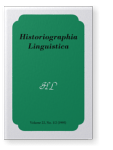Vol. 22:1/2 (1995) ► pp.91–121
Arte de hablar y pragmática
Notas sobre el pensamiento lingüístico de eduardo benot (1822–1907)
This paper deals with the work of the Spanish polygraph Eduardo Benot (1822–1907) and aims at an explanation of some the basic concepts of his grammatical theories. In particular, Benot’s choice of concepts (system, sign, and illocutionary function) is discussed from a modern functional and pragmatic perspective without, however, erasing the linguistic tradition of philosophical and ideological thought that informed his argument. Benot perceives ‘system’ as relational, the opposite of a mere composite of elements. His focus on relationships remains salient throughout his works; for instance, the concept of case, his classification of parts of speech, the fact that the clause is understood as the nuclear grammatical unit are evidence of his approach. Moreover, his particular view of sign and illocutionary function are evidence of his understanding of language as a socially interactive device. Indeed, it is argued that ‘intention’ is at the bottom of his analysis of the linguistic sign: two human minds are required for the linguistic sign to be fully realized. Whereas the first one exhibits and expresses communicative and informative intention, the second understands it. The author finds an astonishing similarity between Benot’s theories and those of modern-day language philosophers like H. P. Grice and others and their concepts of ‘illocutionary function’ and ‘illocutive force’. This similarity, the author holds, is not merely one of terminology, but of the notions of truth conditions and illocutive force within a proposition which were were handled quite similarly by Benot several generations earlier.
Article language: Spanish
